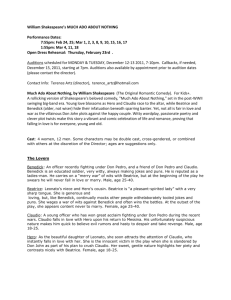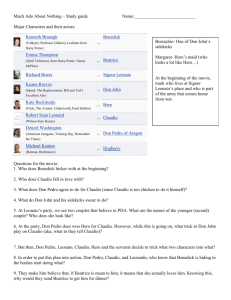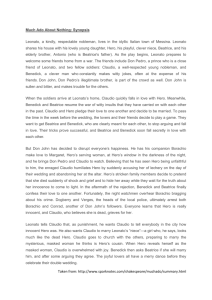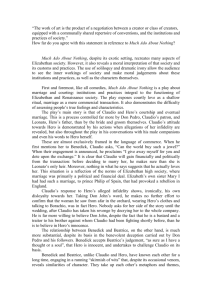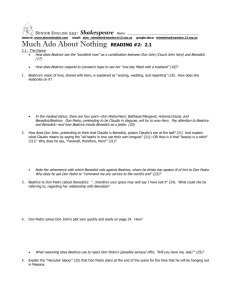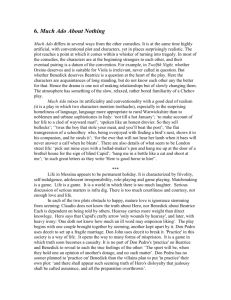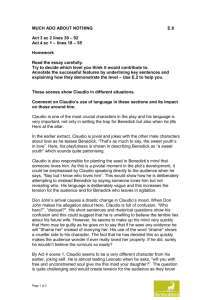Much Ado About Nothing (Summary)
advertisement
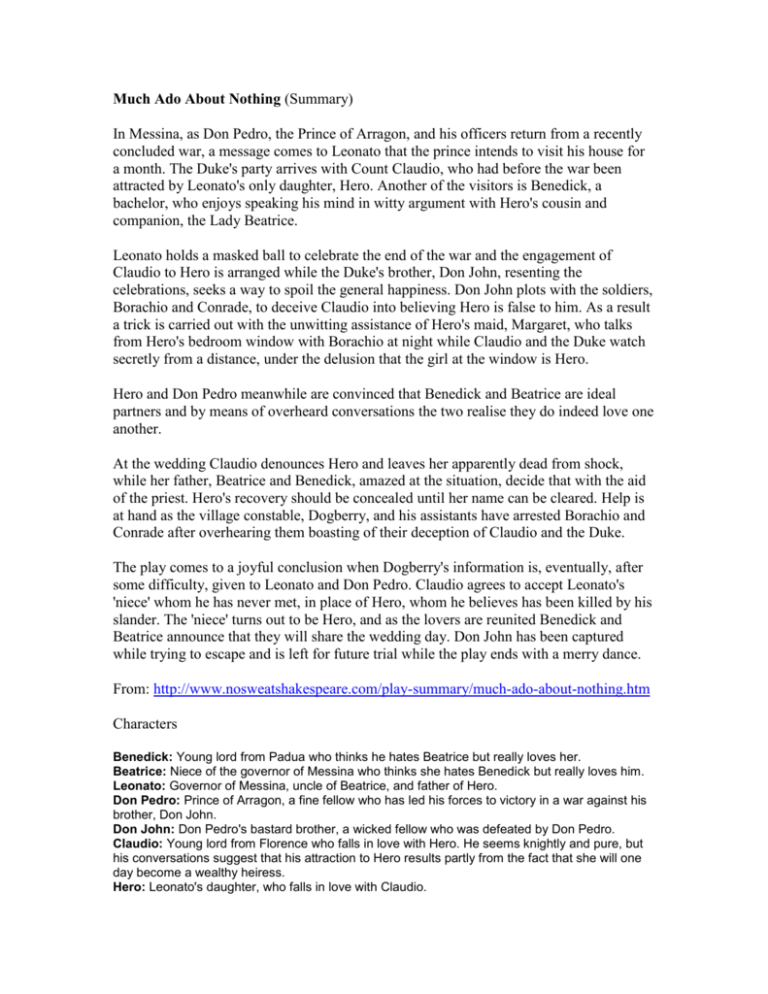
Much Ado About Nothing (Summary) In Messina, as Don Pedro, the Prince of Arragon, and his officers return from a recently concluded war, a message comes to Leonato that the prince intends to visit his house for a month. The Duke's party arrives with Count Claudio, who had before the war been attracted by Leonato's only daughter, Hero. Another of the visitors is Benedick, a bachelor, who enjoys speaking his mind in witty argument with Hero's cousin and companion, the Lady Beatrice. Leonato holds a masked ball to celebrate the end of the war and the engagement of Claudio to Hero is arranged while the Duke's brother, Don John, resenting the celebrations, seeks a way to spoil the general happiness. Don John plots with the soldiers, Borachio and Conrade, to deceive Claudio into believing Hero is false to him. As a result a trick is carried out with the unwitting assistance of Hero's maid, Margaret, who talks from Hero's bedroom window with Borachio at night while Claudio and the Duke watch secretly from a distance, under the delusion that the girl at the window is Hero. Hero and Don Pedro meanwhile are convinced that Benedick and Beatrice are ideal partners and by means of overheard conversations the two realise they do indeed love one another. At the wedding Claudio denounces Hero and leaves her apparently dead from shock, while her father, Beatrice and Benedick, amazed at the situation, decide that with the aid of the priest. Hero's recovery should be concealed until her name can be cleared. Help is at hand as the village constable, Dogberry, and his assistants have arrested Borachio and Conrade after overhearing them boasting of their deception of Claudio and the Duke. The play comes to a joyful conclusion when Dogberry's information is, eventually, after some difficulty, given to Leonato and Don Pedro. Claudio agrees to accept Leonato's 'niece' whom he has never met, in place of Hero, whom he believes has been killed by his slander. The 'niece' turns out to be Hero, and as the lovers are reunited Benedick and Beatrice announce that they will share the wedding day. Don John has been captured while trying to escape and is left for future trial while the play ends with a merry dance. From: http://www.nosweatshakespeare.com/play-summary/much-ado-about-nothing.htm Characters Benedick: Young lord from Padua who thinks he hates Beatrice but really loves her. Beatrice: Niece of the governor of Messina who thinks she hates Benedick but really loves him. Leonato: Governor of Messina, uncle of Beatrice, and father of Hero. Don Pedro: Prince of Arragon, a fine fellow who has led his forces to victory in a war against his brother, Don John. Don John: Don Pedro's bastard brother, a wicked fellow who was defeated by Don Pedro. Claudio: Young lord from Florence who falls in love with Hero. He seems knightly and pure, but his conversations suggest that his attraction to Hero results partly from the fact that she will one day become a wealthy heiress. Hero: Leonato's daughter, who falls in love with Claudio. Margaret, Ursula: Hero's attendants. Antonio: Leonato's brother. Balthasar: Don Pedro's attendant. Conrade, Borachio: No-good followers of Don John. Friar Francis: Priest who helps Hero regain her reputation. Dogberry: Constable of Messina. Verges: Headborough. Sexton Boy Minor Characters: Messengers, Watchmen, Attendants. Themes . The road to marriage is often lined with pitfalls and impediments. Benedick and Beatrice are hostile lovers before they warm to each other. Claudio doubts Hero's chastity before he is proven wrong. People often wear masks to disguise their true feelings. For example, Benedick and Beatrice pretend to despise each other even though they love each other, and Don John pretends to be remorseful when all the while he is plotting revenge. All is not what it seems. Mistaken identities, false accusations, misleading conversations, and ironic outcomes all confound the principle characters. This theme is a variation of Theme 2. Love is NOT blind. Benedick well knows that Beatrice has a sharp tongue whose stings he must endure if he is to be her husband and live with her for decades to come. Likewise, Beatrice well knows Benedick's faults. Yet, before the end of play, they acknowledge their deep love for each other and marry. Love IS blind. Hero ignores Claudio's faults. For example, she accepts Claudio as her husband even though only a short time before he so readily believed the slanders against her, called her a "rotten orange," and agreed to marry another in her place. Moreover, she never questions his motives—one of which, apparently, is to marry into money. (He had previously inquired whether Governor Leonato had a son and was told Hero was Leonato's only child and, thus, sole heir to his property.) A woman's chastity is a treasure no man should possess except in marriage. The brouhaha over the false charge that Hero slept with a stranger underscores the high regard that the central characters in the play have for a virginal bride. From: http://www.cummingsstudyguides.net/xMuchAdo.html
